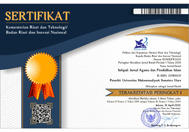PERDA Baca Tulis Al-Quran: Studi terhadap Respon Wali Nagari dalam Meningkatkan Pendidikan Agama di Talu
Abstract
The local government has the authority to take policy, as has the Regent of West Pasaman period 2007 has taken policies related to improving the reading ability of the Qur'an for every child in the government area he leads. This research will trace how the regent responded in enforcing perda No. 9 year 2007 so as to give birth to a generation that is able to read the Qur'an well and have sufficient religious understanding. The design of this study is qualitative, while the data sources that researchers use are nagari guardians, purposively selected citizens, community leaders, according to the desired data then in this study used data collection techniques in the form of observations, interviews and documentation studies. The results of the study prove that: first, Wali Nagari has a positive response, the indicator is the instruction of the guardian agari to all citizens to submit their children to the mosque and mushalla to get a reading education writing the Qur'an, renovate the mosque and mushalla to be worthy as a place to learn to read the Qur'an, complete the necessary facilities, give appreciation to the teachers paying in every mosque and mushalla that is in Talu nagari. Second, children's understanding of Islamic religious education has increased since the regulation of the area was established.
Keywords
Full Text:
PDFReferences
Asamoah, K. (2012). A qualitative study of Chieftaincy and Local Government in Ghana. Journal of African Studies and Development Vol., 4(3), 9095. https://doi.org/10.5897/JASD11.089
Boyd, J. H. (1917). Socialization of the Law. The University of Chicago Press, 22(6), 822837.
Fadly, M., Supriatna, T., Mulyati, D., & Simangunsong, F. (2018). The Local Government Strategy in Sub-District Development as the Center of Economic Development with One Sub-District One Product Based at Mukomuko Region in Bengkulu Province. Journal of Public Administration and Governance, 8(3), 374387. https://doi.org/10.5296/jpag.v8i3.13545
Fauziah, R., Ritonga, M., & Alrasi, F. (2020). Korelasi Tsiqah Tahfidz Al-Quran dengan Maharah al-Lughah al-Arabiyyah Mustawa Tsalits Mahad Az-Zubair bin Al-Awwam. EL-TSAQAFAH Jurnal Jurusan PBA, 19(1), 2536. https: journal.uinmataram.ac.id/index.php/eltsaqafah%0AKORELASI
Ford, A. Y., & Alsup, P. (2018). Planning Science Classroom Facilities and Resources to Improve Students Attitudes. Educational Planning, 24(4), 2748.
Ganjvar, M. (2019). Islamic Model of Childrens Spiritual Education (CSE); its influence on improvement of communicational behaviour with non-coreligionists. International Journal of Childrens Spirituality, 24(2), 124139. https://doi.org/10.1080/1364436X.2019.1624254
GKKIR, N. (2008). Dialectic Relationship between The Quran and Society In Islamic Hermeneutical Traditions. Sleyman Demirel niversitesi ?lahiyat Fakltesi Dergisi Review of the Faculty of Divinity, University of Sleyman Demirel, 1(20), 123.
Hakim, R., Ritonga, M., Khadijah, & Susanti, W. (2020). Implementation of Contextual Teaching and Learning in Islamic Education at Madrasah Diniyah. Journal of Advanced Research in Dynamical & Control Systems, 12(02), 33263332. https://doi.org/10.5373/JARDCS/V12I2/S20201455
Hakim, R., Ritonga, M., & Susanti, W. (2020). Institute Quality Improvement Through Management Training of Accreditation Preparation in TK Aisyiyah Bustanul Athfal Padang. Advances in Social Science, Education and Humanities Research, Volume 449 Proceedings of the International Conference of Early Childhood Education (ICECE 2019), 44(Icece 2019), 5565. https://doi.org/https://doi.org/10.2991/assehr.k.200715.012
Hayadin. (2011). Implementasi Kebijakan Pemerintah Daerah tentang Kemampuan Baca-Tulis Al-Quran. EDUKASI Jurnal Penelitian Pendidikan Agama Dan Keagamaan, 9(1), 43684390.
Hayadin. (2013). Kesesuaian Isi Peraturan Daerah Kabupaten Banjar No. 04 Tahun 2004 tentang Baca Tulis al-Quran dengan Kurikulum Nasional Pendidikan Agama Islam. EDUKASI Jurnal Penelitian Pendidikan Agama Dan Keagamaan, 11(04), 3345.
Kartika, A. W. (2019). Urgency of Socialization Regulation Regarding Establishment of Village Regulations. UNTAG Law Review (ULREV), 3(2), 178187. http://jurnal.untagsmg.ac.id/indeks.php/ulrev/indeks
Mahdi, I. (2013). Kebijakan Pemerintah Daerah dalam Mengentaskan Buta Baca Al-Quran (Persiapan Penerapan Perda No. 5 Tahun 2014 tentang Wajib Bisa Baca al-Quran Bagi Siswa dan Calon Penganten di Kabupaten Bengkulu Tengah). Manhaj, 1(3), 1726.
Marmoah, S., Adela, D., & Fauziah, M. (2019). Implementation of Facilities and Infrastructure Management in Public Elementary Schools. Al-Tanzim : Jurnal Manajemen Pendidikan Islam, 03(01), 102134. https://ejournal.unuja.ac.id/index.php/al-tanzim
Noer, S. M., Ritonga, M., Ekawati, R., Septiana, V. W., & Susanti, D. (2020). Compact Disc Interactive Design Tutorial and Effect on the Improvement of Learning Network Computer Lessons. Nternational Journal of Advanced Science and Technology, 29(8), 457467.
Noh, A. C., & Huda, M. (2020). Understanding The Quran Resources as Main Principle for Family Institution in Islamic Education. Journal of Critical Reviews, 7(2), 688692. https://doi.org/http://dx.doi.org/10.31838/jcr.07.02.126
Novita, P. (2019). What Happened to Initial Teacher Education in Indonesia? AReview of the Literature. European Journal of Social Sciences Education and Research, 6(3), 88103.
Nurhattati, Matin, Buchdadi, A. D., & Yusuf, C. F. (2020). Teacher Certification in Indonesia: An Education Policy Analysis. Universal Journal of Educational Research, 8(5), 17191730. https://doi.org/10.13189/ujer.2020.080508
Nurlaili, Ritonga, M., & Mursal. (2020). Murojaah Sebagai Metode Menghafal al-Quran Studi Pada Rumah Tahfiz Yayasan Ar-Rahmah Nanggalo Padang. Menara Ilmu, XIV(02), 7382.
Rahman, S. A., Baharuddin, N., Ahmad, H. bin, Baharun, H., Sempo, M. W., Saad, N. S. M., Muhammad, N. A. F., & Nizah, M. A. M. (2017). Exploring the Level of Understanding the Content of Quran among Diverse Groups of People. Sains Insani, 2(1), 6165. https://doi.org/10.33102/sainsinsani.vol2no1.52
Ritonga, M. (2015). Pandangan Para Ahli Bahasa tentang Bahasa Serapan dalam al-Quran. Afkaruna: Jurnal Ilmu-Ilmu Keislaman, 11(2), 160267. https://doi.org/10.18196/AIIJIS.2015.
Ritonga, M. (2016). Bargaining Kata di Dalam Al Quran : Kontroversi Ahli Terhadap Bahasa al Quran. Akademika, 21(2), 229254. http://e-journal.metrouniv.ac.id/index.php/akademika/article/view/466
Ritonga, M., Asrina, Widayanti, R., Alrasi, F., Julhadi, & Halim, S. (2020). Analysis of Arabic Language Learning at Higher Education Institutions with Multi-Religion Students. Universal Journal of Educational Research, 9(269), 43334339. https://doi.org/10.13189/ujer.2020.080960
Sitompul, F., Lumbanraja, P., & Tarmizi, H. B. (2020). Effect of Good Governance Application against Public Satisfaction with Excellent Service as an Intervening Variable in the Medan Tembung Sub-District Office. International Journal of Research and Review, 7(1), 244252. www.ijrrjournal.com
Supriyadi, T., & Julia, J. (2019). The Problem of Students in Reading the Quran: A Reflective-Critical Treatment through Action Research. International Journal of Instruction, 12(1), 311326.
Takriti, R. A., Barret, M., & Buchanan-Barrow, E. (2006). Childrens understanding of religion: Interviews with Arab-Muslim, Asian- Muslim, Christian and Hindu children aged 5-11 years. Mental Health, Religion & Culture, 9(1), 2942. https://doi.org/10.1080/13674670512331335677
Thomas, J., & Harden, A. (2008). Methods for the thematic synthesis of qualitative research in systematic reviews. BMC Medical Research Methodology, 10, 110. https://doi.org/10.1186/1471-2288-8-45
Tisnelly, Ritonga, M., & Rasyid, A. (2020). The Competency of Islamic Education Teachers in Madrasah Ibtidaiyah 1 West Pasaman After Certification. Ruhama: Islamic Education Journal, 3(1), 4556. https://jurnal.umsb.ac.id/index.php/ruhama/article/view/1940/1616
DOI: https://doi.org/10.30596/intiqad.v12i2.5263
Refbacks
- There are currently no refbacks.
Intiqad Jurnal Agama dan Pendidikan Islam is abstracting & indexing in the following databases:
View My StatsEditorial Address:
Faculty of Islamic Religion, Universitas Muhammadiyah Sumatera Utara. Jl. Mukhtar Basri No. 3 Medan 20238 Telp. (061) 6622400 ext. 27 dan 28 Fax. (061) 6625474. e-mail: intiqad@umsu.ac.id

























